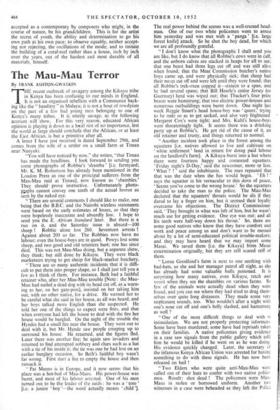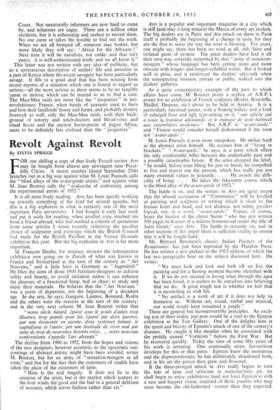The Mau-Mau Terror
By FRANK ASHTON-GWATKIN
THE recent outbreak of savagery among the Kikuyu tribe in Kenya has been confusing to our minds in England. It is not an organised rebellion with a Communist back- ing like the " banditry " in Malaya; it is not a bout of rowdyism on the part of a few bad young men belonging to one of Kenya's many tribes. It is utterly savage, as the following account will show. For this very reason, educated African opinion is playing it down as a local riot of no importance, lest the world at large should conclude that the African, or at least the East African, is but a primitive after all.
A letter I have just received is dated September 29th, and comes from the wife of a settler on a small farm at Timau near Nanyuki.
"You will have noticed by now," she writes, "that Timau has made the headlines. I look forward to sending you some photographs of Robbie's `shamba ' [i.e. farmyard; Mr. K. M. Robertson has already been mentioned in the London Press as one of the principal sufferers from the Mau-Mau raid at Timau], now known as ' shambles.' They should- prove instructive. Unfortunately photo- graphs cannot convey one tenth of the actual horror as seen by the naked eye. . There are several comments I should like to make, one -being that the B.B.C. and the Nairobi wireless statements were based on the early estimates of losses, so that they were hopelessly inaccurate and absurdly low. I hope to send you the E. African Standard later. But there is a run on it, and the Saturday issue is absurd-100 sheep ! Robbie alone lost 260. Seventeen arrests ! Against about 200 so far. The Robbies now have no labour; even the house-boys are in quod. Powys lost some sheep, and two good and old retainers hurt; one has since died. This was not Mau-Mau doing, but a separate show, they think; but still done by Kikuyu. They were black marketeers trying to get sheep for black-market butchery.
" There are so many authentic incidents that it is diffi- cult to put them into proper shape, so I shall just tell you a few as I think of them. For instance, Beth had a faithful retainer who, after her Mau-Mau trouble [Note : the Mau- Mau had nailed a dead dog with its head cut off, as a warn- ing to her, on her gate-post], insisted on her taking him out, with no other native, for a drive. He warned her to be careful what she said in her house, as all was heard, and her boys talked more English than she suspected. He told her one of the things to expect were fires, and that when everyone had left the house to deal with the fire her house would be burgled. On the night of the trouble the Hyndes had a small fire near the house. They went out to deal with it, but Mr. Hynde saw people creeping up to surround his house. He returned, and the figures fled. Later there was another fire; he again saw invaders and returned to find attempted robbery and clues such as a hat with a tie of his inside it; the tie was one he had lost on an earlier burglary occasion. So Beth's faithful boy wasn't far wrong. First start a fire to empty the house and then ransack it.
" Pat Munro is in Europe, and it now seems that his place was a hot-bed of Mau-Maus. His power-house was burnt; and most of his labour arrested. One of hiS men turned out to be the leader of the raids : he was a ' toto ' [i.e. a junior ` boy '—the word actually means ' child 'J. The real power behind the scenes was a well-trusted head- man. One of our two white policemen went to arrest him yesterday and was met with a panga ' [i.e. large forest knife] attack. So he shot the boy dead, for which we are all profoundly grateful.
" I don't know what the photograph's I shall send you are like, but I do know that all Robbie's cows were in calf, and the unborn calves are stacked in heaps for all to see; that one beast had three legs cut off and was still alive when found; that the Meat Commission butcher's native boys came up, and were physically sick; that sheep had their noses cut off and were left until they were found; that all Robbie's trek-oxen copped it—sixteen to a span, and he had several spans; that Bill Hearle's entire Jersey (or Guernsey) herd was wiped out; that Thacker's four prize beasts were hamstrung; that two electric power-houses and numerous outbuildings were burnt down. One night last week Reggie Smart's head house-boy was ' queer,' trying to be rude so as to get sacked, and also very frightened.
Margaret Cox's were tight; and Mrs. Kuhl's house-boys were threateningly tight. It seems there was a drinking party up at Robbie's. He got rid of the cause of it, an old retainer and trusty, and things returned to normal.
" Another incident took place in the forest among the squatters [i.e. natives allowed to live and cultivate on ' white settlement' land in return for doing paid labour on the landlord's farm]. A Kikuyu burst into a but where there were fourteen happy and contented squatters.
' Friday night's D-Day,' said the newcomer, more or less.
' What ? ! ' said the inhabitants. The man repeated that that was the date when the fun would begin. ' Eh ! '
says the squatter in his vernacular to this dove of peace, ' Seems you've come to the wrong house.' So the squatters decided to take the man to the police. The Mau-Mau declared that the squatters' throats would be slit if they dared to lay a finger on him, but it seemed their loyalty overcame his objections. The District Commissioner said, ' They brought in what was left of him, but he wasn't much use for getting evidence. One eye was out; and all his teeth were half-way down his throat.' So, there are some good natives who know that they have comfort and work and peace among us and don't want to be messed about by a lot of semi-educated political trouble-makers; and they may have heard that we may import some Masai. We saved them [i.e. the Kikuyu] from Masai extermination originally, but they are still scared stiff of them.
" Lorna Goodhind's farm is next to one seething with bad-hats, so she and her manager patrol all night, as she has already had some valuable bulls poisoned. It is surprising how many natives, even Kikuyu, retch and vomit when they see the shambles on various farms. So few of the animals were actually dead when they were found, and you can see where they had- tried to drag them- selves over quite long distances. They made some very unpleasant sounds, too. Who wouldn't after a night with one's nose cut off and one's belly slashed, and hamstrung as well ?
" One of the most difficult things to deal with is intimidation. We are not properly protecting informers. Some have been murdered; some have had reprisals taken on their families. A native policeman giving evidence in a case saw signals from the public gallery which told him he would be killed if he went on as he was doing. His evidence quickly changed: Later, the secretary of the infamous Kenya African Union was arrested for having something to do with these signals. He has now been released on bail !
" Two Elders who were quite anti-Mau-Mau were called out of their huts to confer with two native police- men. Result: shot dead ! The policemen were Mau- Maus in stolen or borrowed uniform. Another two witnesses in a case were beheaded as they left the Police Court. Not unnaturally informers are now hard to come by, and witnesses are cagey. There are a million other incidents, but it is exhausting and useless to record them.
No one cares or takes the trouble to find out the truth.
When we are all bumped off, someone may bother, but more likely they will say: ' Africa for the Africans ! '
Next time it will be ourselves, not cattle; and that isn't panic; it is well-authenticated truth; and we all know it."
This letter was not written with any idea of publicity, but as a spontaneous description of settlers' life and anxieties in a part of Kenya where the recent savagery has been particularly savage. It fills in a good deal that has been missing from recent reports of a situation which one is bound to regard as serious—all the more serious as there seems to be no tangible cause or motive, which can be treated so as to find a cure. The Mau-Mau raids are more like the " jacqueries " in pre- revolutionary France, when bands of peasants used to burn and loot their landlords' house and farms, and probably destroy livestock as well; only the Mau-Mau raids, with their back- ground of sorcery and witch-doctors and blood-vows and ritual feasts and the ancient hocus-pocus of pagan Africa, seem to be definitely less civilised than the " jacqueries."



































 Previous page
Previous page